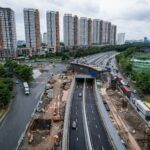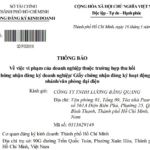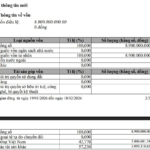After identifying the shortcomings in the current Resolution 98, policymakers face the challenge of designing new criteria that are stringent enough to select the right “eagles” – strategic investors, yet flexible enough not to miss out on opportunities.
This is an ongoing policy debate, fueled by in-depth contributions from leading experts.
Flexibility to Seize Opportunities
A significant perspective comes from Assoc. Prof. Dr. Vũ Anh Tuấn of the Vietnamese-German University, who advocates for tighter financial capacity and project scale criteria to ensure feasibility. He argues that the proposed minimum capital of VND 6,000 billion for an urban railway project is too low. With international investment rates, this amount would only cover 2-3 km of construction, a segment too short to achieve meaningful transportation efficiency. A project of significance requires capital in the billions of USD.
Assoc. Prof. Dr. Vũ Anh Tuấn suggests that strategic investor selection criteria must explicitly demand financial capability, with equity accounting for 20%-30% of total project capital, a solid credit history of at least three years, and proven ability to mobilize large-scale capital from international markets. This ensures the city avoids selecting underqualified investors, mitigating risks for key projects.
Similarly, from the high-tech industry’s perspective, the Management Board of the Ho Chi Minh City High-Tech Park (SHTP) recommends revisiting the proposal to lower the minimum capital for strategic technology projects to VND 1,000 billion. According to SHTP, this threshold (approximately USD 40 million) is too low for high-tech manufacturing, especially in the semiconductor industry, where a fabrication plant requires investment in the billions of USD.
Such a low capital threshold would fail to attract global leaders. SHTP proposes retaining the higher capital levels from the original Resolution 98: VND 3,000 billion for R&D centers and VND 30,000 billion for manufacturing projects.

Attracting strategic investors requires addressing capital scale, disbursement timelines, and streamlined administrative procedures. Photo: QH |
Conversely, Dr. Trần Du Lịch, Chairman of the Advisory Council for Implementing Resolution 98, raises a critical concern. He warns that overly rigid criteria for experience in similar projects could exclude domestic enterprises from emerging sectors like urban railways.
“Vietnam lacks a domestic urban railway industry, so no local company can meet this criterion. Balancing financial capacity and international experience with opportunities for domestic enterprises to develop and participate in the value chain is the greatest challenge in refining the revised Resolution 98,” Dr. Trần Du Lịch notes.
Granting Designation Authority, Extending Timelines
While criteria discussions continue, two breakthrough solutions in the draft Resolution 98 revision have gained widespread support. These are seen as key to resolving persistent issues identified over two years of implementation.
The first and most crucial solution addresses the major hurdle highlighted by Dr. Trần Du Lịch: the mandatory tendering requirement for selecting strategic investors.
Dr. Trần Quý, Director of the Vietnam Institute of Digital Economy, analyzes this as a fundamental contradiction. The city actively invites global conglomerates but requires them to participate in a tendering process unsuited to mega-projects. The draft revision proposes granting Ho Chi Minh City the authority to designate investors. This mechanism, similar to the special policy applied to urban railway projects under Resolution 188, will shift the city from a passive to a more proactive role in engaging and selecting partners with superior technology and capabilities.
|
Anticipated Breakthrough Impact As the advisory body to the Ho Chi Minh City People’s Committee, the Department of Finance has led the completion of the draft amendment to Resolution 98 in collaboration with relevant departments. The revision focuses on two strategic priorities: “1 amendment – 1 addition.” First, it amends and expands the list of priority sectors for strategic investor attraction. The goal is to remove barriers in selection mechanisms and investment conditions while adding high-impact, transformative projects aligned with the city’s new status as a megacity. The second priority introduces special mechanisms and policies for the Cái Mép Hạ Free Trade Zone (FTZ). This entirely new initiative is expected to create a breakthrough, transforming the area into an international logistics, transshipment, and high-tech industrial hub… Whether these new mechanisms are approved depends on the National Assembly’s decision, but the city’s thorough preparation and determination underscore the urgency of completing this legal framework to unlock development resources. QUÁCH NGỌC TUẤN, Deputy Director of the Ho Chi Minh City Department of Finance |
The second solution directly addresses the unrealistic capital disbursement timeline requirement. The current Resolution 98 mandates capital disbursement within five years, which investors in the Cần Giờ International Transshipment Port project deem unfeasible for a 22-year mega-project. The draft revision proposes extending the minimum capital disbursement period to 10 years for large infrastructure projects.
This adjustment is critically important, aligning Vietnam’s policies more closely with international standards, reducing risks, and enhancing appeal for long-term strategic investors.
Need for a Radical Shift in Decentralization
However, Dr. Huỳnh Thanh Điền, an economic expert, argues that revising certain provisions as proposed is insufficient. For Resolution 98 to truly drive breakthroughs, a radical shift in decentralization and empowerment is needed. He points out that previous special mechanisms were often neutralized by conflicting sector-specific laws. He likens granting authority to the city with the condition “in accordance with the law” to giving with one hand and taking away with the other.
Dr. Huỳnh Thanh Điền proposes a fundamental change: granting Ho Chi Minh City full authority over planning, investment licensing, and land-use conversions within its jurisdiction, without requiring approval from ministries, as long as national master plans are followed.
“The city should even have autonomy in setting salary, bonus structures, and KPIs for its public sector to attract and retain talent, suited to the high living costs and demands of a megacity. Only with true decision-making power can Ho Chi Minh City operate flexibly and competitively on the global stage,” Dr. Huỳnh Thanh Điền suggests.
QUANG HUY THU HÀ
– 05:33 25/11/2025
Land Registration Procedures: Provincial or Communal Level – Which Serves Citizens Better?
The proposal to designate provincial land registration offices as the sole entity handling land procedures has sparked considerable debate. Experts argue that a clear separation of functions between provincial and communal levels is essential to ensure both convenience and effective management.
Resolving Local Governance Challenges: Overcoming Obstacles at the Commune Level in Two-Tier Local Administration
The Government’s Steering Committee urges local authorities and party committees to prioritize the restructuring of organizational apparatuses and the enhancement of staff, civil servants, and public employees at the commune level. This critical and urgent task must be substantially completed by December 2025, with a focus on resolving existing challenges.
Unleashing Ho Chi Minh City’s Potential: Land-Driven Catalysts for Breakthrough Growth
Empowering Ho Chi Minh City with expanded land reclamation authority and broadening the scope of land funds for BT projects will swiftly address land bottlenecks, enabling the city to attract and engage investors more effectively.




















